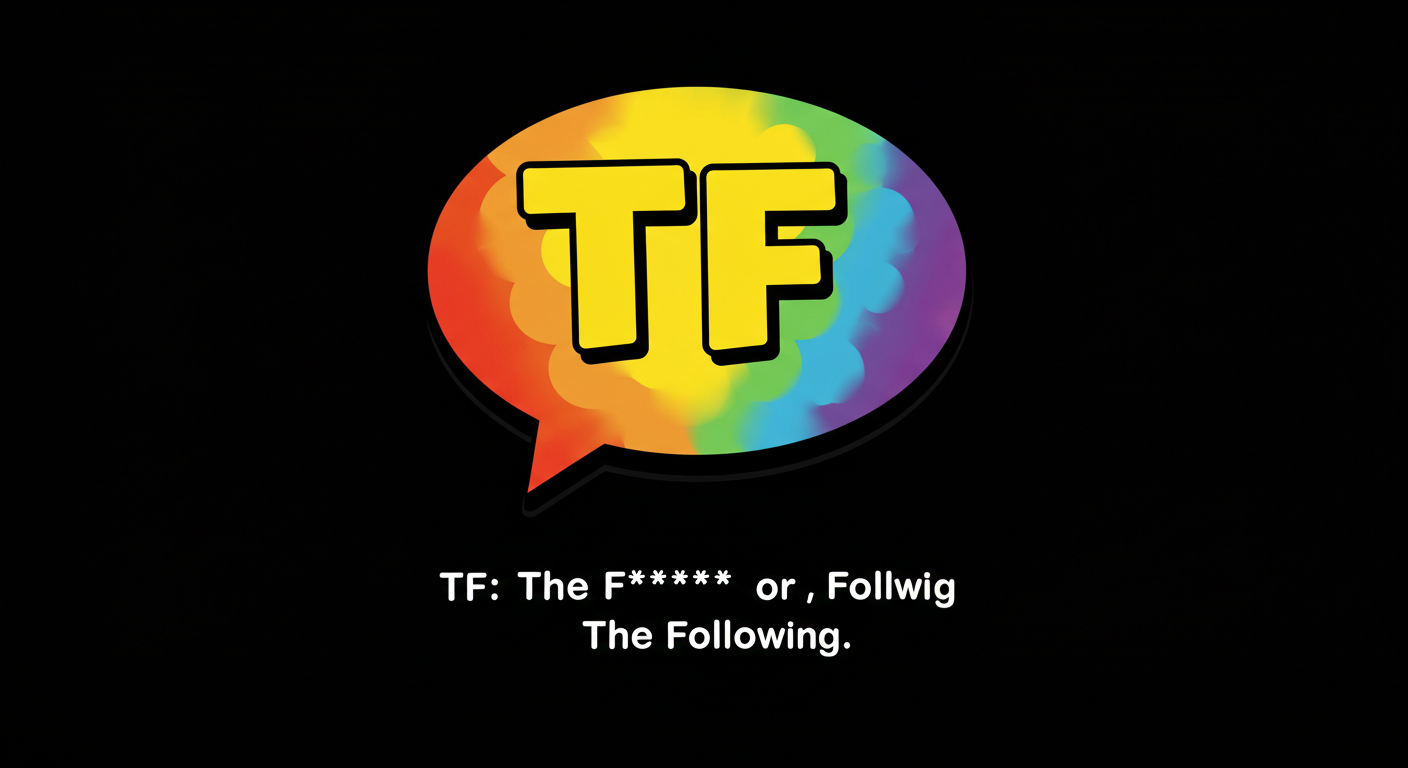Ever been scrolling through a convo and suddenly hit with a “TF?!” that leaves you kinda tilted and wondering if you missed some secret code or just the internet lost its mind again? Yeah, me too.
Honestly, there’s something kinda wild about how one tiny combo of letters can pack a punch so big, depending on who’s saying it, where, and why.
It’s like a digital wild card that’s been tossed around texting slang for ages — but not many really stop and think about all its shades, uses, or how it’s kinda shaped our online banter.
So, pull up a chair, or ya know, keep thumb-scrolling, and let’s dig deep into the world of TF, an acronym that’s more than just a shorthand — it’s a whole vibe.
What Does TF Mean? Decoding the Acronym & Definitions
Alright, before we get too fancy, TF can mean different things depending on the crowd you’re rolling with or the platform you’re vibing on. Let’s break it down real quick, ’cause without knowing this, you might get lost in translation.
- The F*:** Yep, this is the OG meaning in casual or vulgar texting. It’s a shock or surprise expletive, often used when something’s just mind-boggling or totally off-the-wall. If someone texts, “TF is going on?!” they’re basically screaming “What the heck is happening?!” but with way more emotional oomph and maybe a bit of sass.
- Task Force: In a totally different universe — like professional or military speak — TF might stand for Task Force, a group assembled for a specific mission or project. Pretty far from the internet slang, huh?
- Team Fortress: For the gamers out there, TF can refer to Team Fortress, the classic multiplayer shooter that’s been around since the early 2000s, spawning sequels and a dedicated fanbase.
So yeah, TF wears many hats, and you gotta be savvy about context. Are you chatting on Discord, emailing your boss, or just reacting on Twitter? That changes everything.
The Rise of TF in Texting and Social Media 💬
Back in the 20th century, before texting was a legit form of language (can you imagine?!), acronyms like TF were mostly confined to the shadows of gamer forums or underground chatrooms.
But as social media exploded and Gen Z embraced lightning-fast communication with slang, TF became this go-to expression for quick, raw emotion.
People in English-speaking regions, especially younger audiences like Millennials and Gen Z, loved it because it’s casual, punchy, and loaded with emotional intensity it’s like an expletive shorthand that softens the blow, making it easier to throw out in casual convos or group chats.
But it’s also morphed in non-English regions and more conservative cultures where the phrase might be swapped out or misunderstood, showing just how language adapts to social norms and cultural sensitivities.
How TF Expresses Emotional Intensity: Shock, Frustration & Humor 🧠
There’s an art to using TF correctly. It’s not just a blank expletive — it carries emotional weight depending on the tone and situation. Here’s a peek at the moods it captures best:
- Shock or Surprise: When you see something that just doesn’t compute, like a crazy news update or a bizarre tweet, a quick “TF?!” is the perfect shorthand for “Wait, seriously?!”
- Frustration: Got a work email that’s totally confusing or a friend who’s late again? “TF is wrong with you?” nails that annoyed vibe with zero extra words.
- Humor and Playfulness: Sometimes, it’s not about anger but poking fun — like “TF are you doing, dude?” after a friend tries an epic fail move in gaming or life.
Interestingly, this emotional versatility is what’s made TF stick around — it’s an emotional Swiss Army knife in digital communication.
TF vs. Task Force vs. Team Fortress: Clarifications & Comparisons 🧾
It’s easy to get these mixed up if you’re not paying attention, especially since all three meanings pop up in vastly different contexts.
- TF (The F*):** Informal, often vulgar, used in casual texting, social media, dating apps, and sometimes forums or chatrooms. Totally inappropriate in professional communication or work emails, unless you want a serious HR meeting.
- Task Force: Formal and professional, used in business, military, or organizational contexts. Definitely no cursing here — just teamwork and mission vibes.
- Team Fortress: A niche term known mostly to gamers, appearing in gaming slang and related discussions. Mention it to a gamer, and you’ll get nostalgia or hype; mention it in a casual chat? Expect blank stares.
Knowing where you are and who you’re talking to is key when tossing out TF. No one wants to accidentally drop an expletive in a serious work email, trust me.
TF in Different Communication Contexts: From Group Chats to Dating Apps 💬
The versatility of TF shines when you see how it fits in different digital spaces:
- Group Chats: With friends or colleagues, it’s a quick way to show surprise or frustration without typing out a whole sentence. Like “TF?! Did you see that meme?”
- Social Media & Twitter/X: Here, it’s almost a meme staple — people use it in comments or tweets to react instantly to weird news, unexpected trends, or just plain nonsense.
- Gaming: In Discord or gaming forums, TF might mean frustration during a bad round or just a playful jab at teammates. “TF was that move?!”
- Dating Apps: Often, it’s used humorously or sarcastically to call out weird messages or behaviors — but be careful, it can come off harsh if the tone’s not right.
- Professional Communication: Pretty much a no-go unless you want to shock HR or lose your job. Better to stick with polite alternatives like “What on earth?” or “I’m confused.”
Younger Audiences and the Evolution of TF in English-Speaking Regions 🧑🤝🧑
What’s fascinating is how TF reflects the broader shift in communication styles among Millennials and Gen Z. They love quick, punchy slang that packs feelings and sarcasm into minimal text. It’s like emotional shorthand tailored for real-time reactions and meme culture.
Even beyond English-speaking Western countries, the acronym has seeped into online communities worldwide, sometimes adapted or softened for cultural appropriateness.
Non-English speakers may recognize it in memes or gaming but swap it with local slang for a similar vibe. This cross-pollination of slang shows how language in digital communication is fluid and ever-evolving.
Milder Alternatives and When Not to Use TF 🛑
Because TF can come across as vulgar or offensive, many opt for gentler versions in casual chats or professional settings:
- “WTF” (still strong, but more common)
- “What the heck” or “What the flip” (mild, family-friendly)
- “No way!” or “Seriously?” (shock without vulgarity)
It’s important to read the room. In conservative cultures or formal chats, dropping TF might risk misunderstandings or offend someone unknowingly. A little mindfulness goes a long way in digital chats, especially when tone is super hard to read.
How to Use TF Effectively: Tips for Contextual Relevance and Tone Matching 🔍
Wanna sound savvy and not like you just stumbled off a troll farm? Here’s some quick advice on using TF right:
- Match the tone: Use it when you’re with friends or casual groups, not formal or professional audiences.
- Know your platform: Discord and Twitter love this vibe, work emails do not.
- Use emoji for clarity: Pair it with a shocked or laughing emoji to soften or emphasize meaning.
- Avoid overuse: Like any slang, too much TF makes it lose its punch and just feels lazy.
- Consider alternatives if unsure: When in doubt, swap it out for a milder phrase.
Cultural Anecdotes and Real-Life Appeal: TF Around the Globe 🧾
In the U.S., dropping a “TF?!” in a group chat after a shocking sports upset is like a national pastime. Meanwhile, in Japan, digital slang is often more polite and context-sensitive, so direct expletive acronyms like TF rarely surface openly, instead replaced by more subtle emoji-driven expressions.
I once heard from a grandparent in Brazil who joked, “When my grandkids text ‘TF,’ I just assume it means ‘Task Force’ or maybe ‘Time for Food’ — cause I’m too old for their slang!” That just shows how meanings morph with age and cultural lenses.
Wrapping It Up
So yeah, TF might look simple, but it’s layered with meaning, emotion, and culture — kinda like a secret handshake of the texting world. Whether you’re using it to express surprise, frustration, or just joining in on meme culture, remember it’s all about context and connection.
Before you fire off that TF next time, ask yourself: Who’s gonna read this? What’s the vibe? Am I trying to shock, joke, or seriously ask “What the heck?” Understanding these layers not only makes your communication clearer but also keeps your relationships smooth and fun.
How to Write a Custom Message Using TF
If you wanna get personal and creative:
- Combine TF with a specific situation — “TF is happening with the project? This deadline’s insane!”
- Add a little humor or warmth — “TF, you came back with snacks? Legend.”
- Use emojis to express your true emotion — “TF?! 😳🔥” adds surprise and intensity.
Share Your Thoughts!
Got a wild TF story or fave way to use the acronym? Drop it in the comments! It’s always cool to see how different folks spin this simple phrase into something uniquely theirs.
Frequently Asked Questions
What does TF mean in text?
TF usually stands for “The F*” — a shorthand used to express shock, surprise, or disbelief in casual messages.
TF in text
In texting, TF adds emotional emphasis and is commonly used in informal conversations among friends or gamers.
What does TF mean in texting?
In texting, TF is a softer version of a strong expletive, often used to react to unexpected or confusing situations.
What does TF stand for in texting?
TF stands for “The F*” in texting, expressing frustration, confusion, or strong surprise in a casual tone.
TF meaning in social media
On social media, TF is used to react quickly to shocking or absurd posts, helping users express raw emotion or disbelief.











